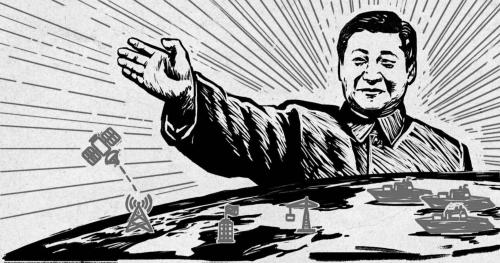As 2021 draws to a close — the first year of the Biden administration, and second year of the COVID-19 pandemic — there are no shortage of questions about the future of international order, foreign policy, and American democracy. But a slew of insightful books from Brookings Foreign Policy experts published this year can help us better understand where we stand and where we may be headed.
China, the United States, and Asia’s future

A number of those books focus on China’s rise and evolution as a global actor, the increasingly fraught relationship between China and the United States, and the implications of both. “Global China: Assessing China’s Growing Role in the World,” edited by Tarun Chhabra, Rush Doshi, Ryan Hass, and Emilie Kimball, features the analysis of dozens of scholars from Brookings and beyond on how China is shaping great power relations, critical technologies, Asian security, key regions beyond Asia, and global governance and norms. In “Stronger: Adapting America’s China Strategy in an Age of Competitive Interdependence,” Hass writes that while competition will define the U.S.-China relationship, coordination on common challenges will remain vital. He urges that Washington will have greater success competing economically and on governance if it focuses more on improving conditions at home than on trying to impede Beijing’s initiatives. In “The Long Game: China’s Grand Strategy to Displace American Order,” Doshi — who, along with Chhabra, is now serving on the staff of the National Security Council — draws on Chinese Communist Party documents to argue that China has pursued strategies to displace American order and replace it with Chinese order regionally and now globally.
Meanwhile, Cheng Li’s “Middle Class Shanghai: Reshaping U.S.-China Engagement” makes the case that the U.S. should not lose sight of the dynamism and diversity inside modern China, and that the rising middle class and cosmopolitan culture exemplified by Li’s native city of Shanghai could provide an avenue for engagement and exchanges. In “China’s Youth: Increasing Diversity amid Persistent Inequality,” from the John L. Thornton China Center’s Chinese Thinker Series and with an introduction from Cheng Li, Chinese sociologist Li Chunling provides a native perspective on the values, behaviors, and lifestyles of the diverse generation born between the 1980s and mid-1990s, who at some point will assume leadership of the country.
Brookings experts also narrow in on other parts of Asia, shedding light on pertinent issues set to shape the future of the region. “Rivalry and Response: Assessing Great Power Dynamics in Southeast Asia,” edited by Jonathan Stromseth, explores competition between the U.S. and China in the strategic landscape of Southeast Asia. A key finding of the volume is that U.S. policy has become too concentrated on defense and security, neglecting many countries’ immediate economic development priorities. In “Difficult Choices: Taiwan’s Quest for Security and the Good Life,” Richard C. Bush details the growing internal and external pressures Taiwan faces and offers suggestions for what Taiwan can do to help itself and what the U.S. should do to improve Taiwan’s chances of success. And in “State, Society and Markets in North Korea,” Andrew Yeo evaluates changes in North Korea’s society and economy, revealing how the country manages to teeter forward within the deeply authoritarian context of Kim Jong Un’s rule and what may lie ahead.
Geopolitical currents and grand strategy

Competition between China and the United States is also an important part of the story of the COVID-19 pandemic and its global consequences, as Thomas Wright and Colin Kahl relate in “Aftershocks: Pandemic Politics and the End of the Old International Order.” In their first draft of history, Wright and Kahl — who is now serving as U.S. under secretary of defense for policy — detail the breakdown of international cooperation and examine the responses to and fallout from the pandemic across a wide range of countries. They conclude with recommendations on how to reinvigorate the international order and prepare for the next pandemic. Bruce Jones’s “To Rule the Waves: How Control of the World’s Oceans Shapes the Fate of the Superpowers” focuses on the critical role of the seas in globalization, information and energy flows, and national power, taking the reader from gigantic containerized cargo vessels to vast ports and vital naval bases. Jones argues that the oceans are rapidly becoming the most important zone of contestation between the world’s great military actors. “The Uses and Abuses of Weaponized Interdependence,” edited by Daniel W. Drezner, Henry Farrell, and Abraham L. Newman, examines the vulnerabilities of 21st century great power interdependence to challenge scholars and practitioners to think differently about foreign economic policy, national security, and statecraft.
America’s national security strategy and its military are the focus of several books by Brookings experts this year. In “The Art of War: U.S. Grand Strategy and Resolute Restraint,” Michael E. O’Hanlon highlights the lack of a U.S. grand strategy since the Cold War and lays out a vision for a new one. He proposes that the Pentagon complement its “4+1” set of threats — Russia, China, Iran, North Korea, and terrorism — with an additional “4+1” — biological, nuclear, digital, climatic, and internal dangers. O’Hanlon also published “Defense 101: Understanding the Military of Today and Tomorrow,” a concise primer on the U.S. military focused on four critical areas: defense budgeting and resource allocation, gaming and modeling combat, technological change and military innovation, and the science of war. In “The Inheritance: America’s Military After Two Decades of War,” Mara Karlin — now serving at the Pentagon, performing the duties of deputy under secretary of defense for policy — dissects how two decades of war in Iraq and Afghanistan have influenced the U.S. military, those who serve in it, and civil-military relations.
American democracy, memoirs, and the Middle East

In the aftermath of Donald Trump’s presidency and the January 6 assault on the U.S. Capitol during the count of Electoral College ballots that formalized Joe Biden’s victory, two Brookings experts offer personal accounts highlighting the perilous state of American society and democracy. Fiona Hill’s “There Is Nothing For You Here: Finding Opportunity in the Twenty-First Century,” is a memoir of the author’s journey from growing up in poverty in the deindustrialized North East of England to her experience serving on the Trump administration’s National Security Council and testifying as a fact witness in Trump’s first impeachment trial. Hill draws parallels between lack of opportunity and populist politics in her native U.K., Russia – the country she has focused on professionally – and in the U.S., her adopted home. Hill warns that the America is on the brink of a socioeconomic collapse and authoritarian swing that could rival that of Russia under President Vladimir Putin.
In “Wildland: The Making of America’s Fury,” Evan Osnos returns to the U.S. after a decade abroad in China and the Middle East as a foreign correspondent to find rule of law, the power of truth, and the right of equal opportunity for all under assault at home. Focusing on three communities in which he has lived — Greenwich, Connecticut; Clarksburg, West Virginia; and Chicago, Illinois — Osnos traces the sources of America’s political dissolution through the lives of ordinary individuals.
While Osnos comes home and finds a vital story in today’s United States, in “Assignment Russia: Becoming a Foreign Correspondent in the Crucible of the Cold War,” the second volume of Marvin Kalb’s memoirs, Kalb is chosen by Edward R. Murrow to be CBS News’s man in Moscow at the height of the Cold War, returning to where he’d served as a young diplomatic attaché at the U.S. Embassy. Kalb provides a thrilling eyewitness account of tensions between Eisenhower’s U.S. and Khrushchev’s Soviet Union, and looks back on the beginning of a legendary career in journalism at the dawn of broadcast news.
Finally, in “Jordan and America: A Enduring Friendship,” Bruce Riedel tells the story of one of the most important bilateral relationships in the Middle East. He describes how leaders from Jordan and the United States have navigated multiple crises in one of the most volatile regions in the world, from his unique vantage point as a former Central Intelligence Agency, White House, and Pentagon official who played an important role in building that relationship. In “Tribalism and Political Power in the Gulf: State-Building and National Identity in Kuwait, Qatar and the UAE,” Courtney Freer and Alanoud al-Sharekh examine the political role of tribes in those Gulf societies and the degree to which tribes hinder or advance popular participation in government. And in “The European Union and the Gulf Cooperation Council: Towards a New Path,” co-editors Adel Abdel Ghafar and Silvia Colombo and other scholars assess the relationship between the two important regional blocs and their member states.








Commentary
20 Brookings Foreign Policy books for 2021
December 2, 2021